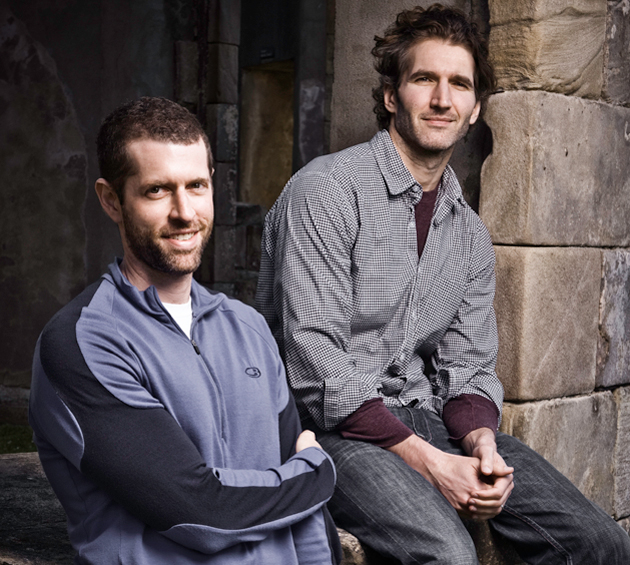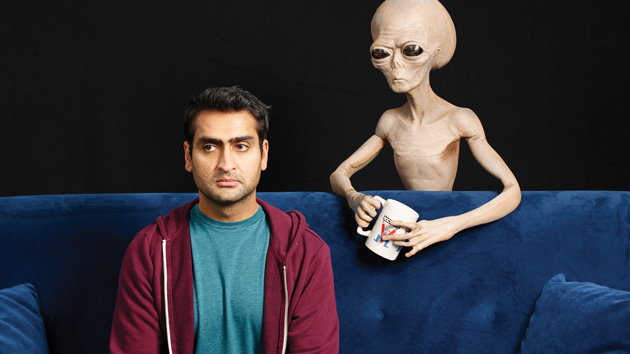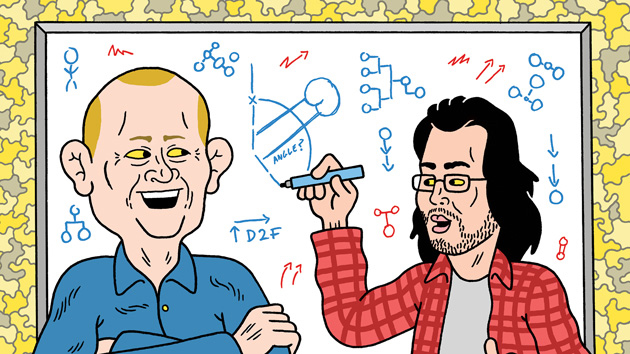
Back in 2006, when David Benioff and Dan Weiss, the creators of the hit HBO series Game of Thrones, sat down with author George R.R. Martin to talk about adapting his epic fantasy series, A Song of Ice and Fire, Martin’s Hollywood bullshit detector was on high alert. “He gave us a pop quiz,” Weiss told one interviewer. But the pair passed Martin’s test because their passion for his books “was real and natural and completely unforced.”
Their geek-boy résumés probably didn’t hurt: Benioff, a D&D dungeon master in his youth, had written the screenplay for X-Men Origins: Wolverine, and Weiss had a video-game-themed novel under his belt. Nor did their willingness to shelve all other creative pursuits—no small sacrifice for Benioff, who had adapted his own first novel, The 25th Hour, into a Spike Lee film starring Edward Norton and followed it up with the fabulous 2008 book City of Thieves.
For the uninitiated, Game of Thrones is an engrossing tale of clans struggling for dominion in the fictional realm of Westeros. (Benioff’s two-second elevator pitch: “The Sopranos in Middle Earth.”) With a stellar crew and ensemble cast anchored by Peter Dinklage as Tyrion Lannister, the dwarf scion of a power-hungry family, the show has raked in 17 Emmy nominations and eight wins, including Dinklage as outstanding supporting actor. In our email interview, Benioff and Weiss weighed in on their favorite characters, learning to “fail better,” and the challenges they ran into while shooting Season three.
Mother Jones: So, what made you want to adapt Martin’s work for the small screen in the first place?
David Benioff and Dan Weiss: Reading the books is a compulsively addictive experience. We had this notion that an HBO adaptation could replicate that. Basically, we wanted to be pusher-men.
MJ: How much obligation do you feel toward the source material?
B&W: We’re under no contractual restrictions with regards to the storytelling. It’s just that we pursued these books—and pushed for the show’s green-light—for almost four years before we got to shoot the pilot. We gave up other opportunities because we love these books and want to do them justice. So for us, it’s about adapting the books according to our notions of justice—which won’t mesh with the fundamentalist book fans’ notions. Which is fine with us because if the fundamentalists were running the show, there wouldn’t be a show.
MJ: The books have way more characters than you could ever include in a series. Were there any that you found particularly painful to cut?
B&W: No. As you say, we knew going in that there was no way to include everyone. Often amalgamations of several characters can be more fun to write than each one separately.
MJ: What do Martin’s fans think of your work, by and large?
B&W: David Ben-Gurion once said that where there are two Jews, there are three opinions—and that applies to a group that reads and rereads holy texts with the passion of Talmudic scholars. So we guess the simplest answer is, “It varies.” But these two Martin fans love the show, and in our admittedly unscientific survey of the book fan base, it seems to have been met with more love than hate, which makes us happy.
MJ: How does a pair of novelists-turned-screenwriters make the jump to “show runners,” which one Los Angeles Times columnist called “one of the most unusual and demanding right-brain/left-brain job descriptions in the entertainment world”?
B&W: There’s a great Beckett line—well, there are a million great Beckett lines, but there’s a relevant one: “Try again. Fail again. Fail better.” That describes our experience of learning on the job.
MJ: Can you give me a sense of your day-by-day?
B&W: On a production day we’d start by going to set and watching the first set up (the master, usually) to see how the scene is playing and whether we need to make any changes. For particularly tricky scenes we’ll stay on set all day. Otherwise we might spend a few hours revising pages, or meeting with directors of upcoming episodes to talk through the scripts, or sitting down with the VFX team or art department to review concept art, or walking over to the costume department with [costumer designer Michele Clapton] to look at her newest creations.
MJ: I take it the response to Game of Thrones exceeded your expectations?
B&W: When HBO was mulling whether or not to green-light the pilot, we kept telling them the show would be a big hit. But we’d never made a TV show before so we didn’t actually know what we were talking about. And we knew we didn’t. We thought it was likelier than not that we were full of shit. In the rare event that we end up not being full of shit, it is always a surprise to us.
MJ: Why do you think Game of Thrones appeals to audiences beyond the fantasy crowd?
B&W: The classic HBO shows (The Sopranos, Deadwood, The Wire) all took established, tired genres and found a way to reinvigorate them. There has never been a gangster as complex or fascinating as Tony Soprano, or a Western villain as compulsively watchable as Al Swearengen, or a television season as beautifully shaped as The Wire, season four. With GoT, we hoped we’d appeal to people who had never heard of wights and wargs, who didn’t know a bastard sword from a halberd. At the end of the day it’s all about the characters. Tyrion Lannister, Arya Stark and the many other compelling characters in George’s books and our show are not beloved because they live in a world where dragons are real. They’re beloved because they experience the things we all experience: they feel like outsiders even when they’re on the inside. They love people who don’t love them back. They’re afraid of power, they yearn for power, they end up with power in spite of themselves and find themselves liking it.
MJ: Which character does each of you most relate to?
Benioff: Theon Greyjoy, especially as interpreted by Alfie Allen. In some ways he’s the most complicated character in a story crammed with complicated characters. He’s scared and lonely and insecure and masks those vulnerabilities with bravado and contempt and arrogance. He reminds me of real 25-year-olds I’ve known. Okay, he reminds me of the real 25-year-old I was. Aside from the child-murdering bit.
Weiss: Everyone starts the season as a Tyrion, but by the end of production, we’re all Hodors.
MJ: Do things get easier with each season?
B&W: Things do not get easier. We thought they would. They don’t.
MJ: How did Season 3 compare in scope with the first two?
B&W: It’s definitely the scopiest. We’re shooting in five countries, with three units and a larger cast than we’ve ever had before. It’s not DeMille—but then, DeMille didn’t have VFX crowd replication, did he?
MJ: Were there any elements that you had to abandon because they were either too pricey or too technically daunting?
B&W: We’ve developed a pretty good sense of how big the box is, so scenes or elements that are completely outside our range usually don’t make it past the outlining stage. There are always scenes that have to go, but it’s generally not about them being too elaborate.
MJ: You guys told one interviewer you were dying to get to Book 3 of the series because there’s a scene that, were you able to pull it off, would basically make your lives meaningful. How’d it go?
B&W: We think we pulled it off, but the jury is still out on life.
MJ: Which new characters and actors are you most eager for us to experience?
B&W: Tough call, but if we had to pick one we’d say Dame Diana Rigg as Olenna Tyrell. We expected her to be great, but she was better than that.
MJ: What are the pros and cons of using different directors for different episodes?
B&W: There’s no physical way we could use the same director for all episodes, because we shoot two or three units every day. When we shoot in Croatia and Morocco we’re also shooting concurrently in Northern Ireland. If we shot feature-film style, with one director, we’d double the length of our season and the size of our budget.
MJ: You recently returned from Iceland. What are some of the unforeseen challenges you’ve run into over there?
B&W: There was the time we were shooting on a frozen lake and we heard a tremendous crack and the entire crew ran for the shore. That was fun. And there is the fact that our Icelandic crew members force us to eat fermented shark. But the biggest challenge may be remembering the 37 pieces of clothing you need to put on in the morning if you don’t want to be frozen stiff by the end of the day.
MJ: Okay, I’d like to get your take on this whole notion of “sexposition.” Do people really pay closer attention to intricate plot points delivered during a sex scene?
Benioff: Personally, I pay less attention to intricate plot points delivered during sex scenes.
Weiss: Yes, that’s a tricky line to walk. Sex grabs people’s attention. But once it has their attention, it tends not to let go of it.
MJ: Some viewers have complained that the show has too much gratuitous sex, but you’ve said that the books actually have a lot more. Can you elaborate?
B&W: From A Dance with Dragons…
The dancers shimmered, their sleek shaved bodies covered with a fine sheen of oil. Blazing torches whirled from hand to hand to the beat of drums and the trilling of a flute. Whenever two torches crossed in the air, a naked girl leapt between them, spinning. The torchlight shone off oiled limbs and breasts and buttocks.
The three men were erect. The sight of their arousal was arousing, though Daenerys Targaryen found it comical as well. The men were all of a height, with long legs and flat bellies, every muscle as sharply etched as if it had been chiseled out of stone. Even their faces looked the same, somehow…which was passing strange, since one had skin as dark as ebony, while the second was as pale as milk, and the third gleamed like burnished copper…
MJ: Game of Thrones could last eight or nine seasons. Does that mean putting novel writing on hold for a decade?
B&W: Yes, if we live that long and HBO keeps wanting to make the show. We have the opportunity here to tell a coherent story that lasts for 80 hours. And while a canvas of that size presents all sorts of storytelling problems, it also allows us to spend more time with these characters we love than we’ll ever get again. Every once in a while we get five minutes to think about thinking about novels. But mostly we’re just happy when we get to read one now and again.
MJ: Finally, I would be remiss if I didn’t get your reaction to the Game of Thrones attack ads we produced last election season…
B&W: That ad raises a lot of interesting issues for the Targaryen campaign, and we’ve yet to see a response.












